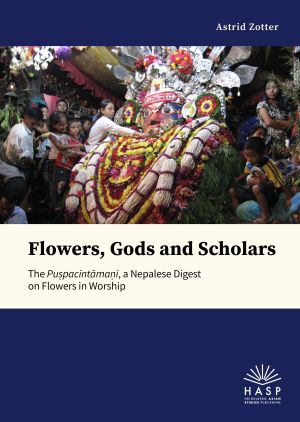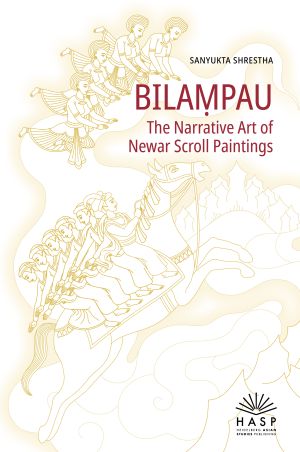##plugins.generic.hdforthcoming.forthcomingBooks##

Flowers, Gods and Scholars
The Puṣpacintāmaṇi is a 17th-century Nepalese digest (nibandha) that compiles authoritative citations on the use of flowers in Hindu worship (pūjā). This book provides a critical edition and translation of the Sanskrit text and its Newari rendering, along with botanical identifications of the flowers mentioned. Furthermore, it analyzes the historical and cultural context of the text, including its place in the Nepalese textual tradition and its relationship to other texts of its genre.
This is a reworked English version of the thesis “Von Blüten, Göttern und Gelehrten: Die Behandlung von pūjā-Blüten im Puṣpacintāmaṇi” (http://nbn-resolving.de/urn:nbn:de:bsz:15-qucosa-102174).

Patriotic Education Bases in China
The ‘patriotic education campaign’ is the most long-standing of all campaigns in the history of the People’s Republic of China and is notable for the breadth of tools it applies. Among these, the system of so-called ‘patriotic education bases’, the number of which has increased massively, stands out in particular. These sites dot the whole country and are aimed at Chinese citizens of all ages.
This book is based on printed and visual materials collected over many years across China, and combines them with personal on-site observations. It explores systematically how narratives and framings have evolved over time, and where the interplay of narrative, visual, and material elements opens up possibilities for divergent readings.

Coṉṉa Vaṇṇam Ceyta Perumāḷ Temple Inscriptions, Kāñcipuram
The 26 inscriptions from the Coṉṉa Vaṇṇam Ceyta Perumāḷ temple in Kanchipuram, an ancient Śrīvaiṣṇava pilgrimage site, were first published in Tamil by G. Vijayavenugopal in 2024. This English translation enriches the original with photographs and several scholarly annotations. The inscriptions shed light on the temple's evolving significance for local communities from the tenth century onward, documenting the gradual emergence of Śrīvaiṣṇava influence. This corpus of inscriptions demonstrates how temple epigraphy deepens our understanding of individual temples' roles in both local and transregional religious history.

Bilaṃpau: The Narrative Art of Newar Scroll Paintings
Bilampau is the first-ever book on the long-format narrative scroll painting of the Kathmandu Valley in Nepal. The book traces the history of this art tradition and explores Buddhist and Hindu religious connections and artistic qualities through visual, textual and contextual analyses. It brings together the study of Bilampaus that were historically painted by Newar artists and presently scattered in world museums and collections in Europe and USA. The study includes field study in Berlin, Germany, and the various Newar Buddhist monasteries in the Kathmandu Valley where these narrative scrolls were painted.

Reframing Tradition in Early Modern India
The volume presents recent scholarly research on Early Modern India by focusing on shifts and challenges to established concepts and norms across various traditions (Sikh, Hindu, Muslim, Jain) and from different perspectives. Structured into four parts, it brings new materials and methods used by contributors to investigate transformational concepts and the variety of intentions involved in altering texts and the exchange of knowledge. The contributors examine Sikh encounters with Nāth, Sant, and Islamic traditions and literary texts, the vernacular connections with and diversions from Sanskrit models in Sufi, Jain, Vaishnava, and Shaiva traditions, interactions between texts and images in historical, political, and literary contexts, and bhakti traditions in Vaishnava and Dādūpanthī communities dealing with questions of authority and femininity in early modern texts.

विद्याराधनम् – Vidyārādhanam
Vidyārādhanam – "Worship of Knowledge" – is the title of this Festschrift for Professor Oberlies, an Indologist who has explored a broad spectrum of subject areas and, through his meritorious work in research and teaching, has made an invaluable contribution to the advancement and dissemination of knowledge. Vidyārādhanam can also be used to describe the entirety of the essays collected in this volume by colleagues, students, and associates of Professor Oberlies, which reflect his diverse research interests and honor him for his academic life’s work to date.

Sound as Affect, Media, Data
The entangled practice of recording, processing, and transmitting sound—as a means of sensing, mediating, and knowing—mirrors the critical inquiries of this volume. We want to engage with how sound resonates across bodies, spaces, and media, producing sensory, affective, and epistemological effects. In delving into the multifaceted expressions of sound as affect, sound as media, and sound as episteme, we aim to offer a contribution at the nexus of sound studies, encompassing media theory, cultural studies, sound art and affect theory. We seek to explore how sonic phenomena shape affective spectrums, transform into matter and media, and enter into the heart of epistemic practice. In the architecture of this volume, there are, therefore, these three thematic lenses: affect and sensoriality; media and materiality; data and epistemology. This structure allows us to trace the specific intellectual lineages and theoretical frameworks that have shaped contemporary sound studies. Yet, we acknowledge that such neat compartmentalization is ultimately artificial. In fact, these three aspects are at times heavily enmeshed with one another. Sensory experience bleeds into material form; media infrastructures shape how we feel, experience, and know; and knowledge emerges not apart from but through embodied, affective, and mediated engagements. Sensing, mattering, and knowing are not separate domains but part of a dynamic and entangled sonic mosaic. This volume embraces that entanglement, offering not a taxonomy of sonic phenomena, but a constellation of perspectives that together illuminate sound's generative role in shaping how we experience, mediate, and understand the world. As several chapters emphasize, these dynamics are also inseparable from the colonial histories that shaped sound technologies.

Characters
Characters: Rights and Roles introduces and interrelates, with a special focus on Japanese visual media (manga, anime, video games, etc.), multiple perspectives on characters in popular culture. Going beyond narratology, art history, and cultural theory, the authors in these 16 chapters bridge perspectives and methodologies from media studies, Japanese studies, and law, in order to expand humanities perspectives on the stakes and interests of copyright holders, licensed and unlicensed creators, legislators, and consumers. The volume’s interdisciplinary approach thus brings into a dialogue, perhaps for the first time, copyright law and the humanities. It addresses the practices and strategies of various parties regarding the production, development, and utilization of characters. In other words, characters are treated as nodes in a range of hetereogeneous, partly overlapping networks – of interrelated character versions, texts and products, industries and rights holders, media formats and platforms. A character then serves as a point from which to explore these various networks through all their rights and roles; conversely, analyzing media network and character mediation helps to identify various character types, their structure and functions.
By bringing together narratology, media studies, and copyright law, as well as digital humanities, this volume explores possibilities for an interdisciplinary, mutually beneficial conceptualization.








